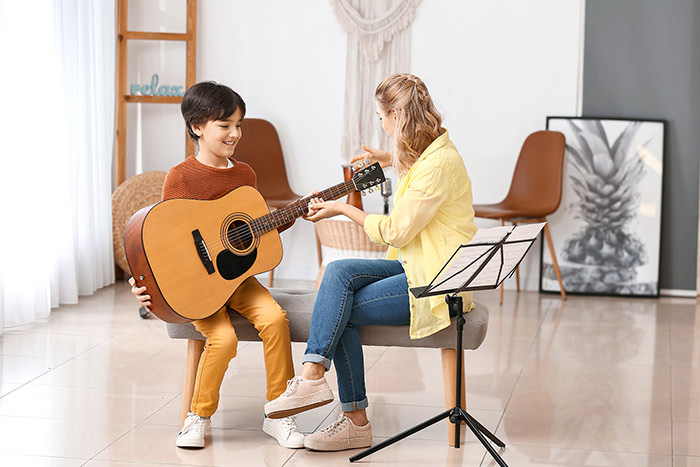The ideal age to start music lessons for kids can vary depending on the child’s individual development, interests, goals, the type of instrument, and the teacher’s approach. However, here are some general guidelines:
Early Exposure (Ages 3-6)
Early exposure, typically occurring between 3 and 6, is a valuable stage in a child’s musical development.
During this period, children are introduced to music through playful and engaging activities, including singing, dancing, and experimenting with simple rhythm instruments.
While not formal music lessons, these early experiences foster a child’s innate musical curiosity, rhythm, and appreciation for sound.
Early exposure lays the foundation for potential future interest in formal music lessons and helps children build a connection with the world of music from a young age. These early exposures can help foster a love for music and rhythm.

Pre-School (Ages 4-6)
The preschool stage, typically ages 4 to 6, is a suitable time for many children to begin formal music education.
During this period, kids can engage in introductory music programs or group classes emphasising fundamental musical concepts, basic ear training, and interactive musical activities.
While these experiences are designed to be fun and age-appropriate, they lay the groundwork for more structured music lessons in the future.
Pre-school music lessons often focus on building a strong musical foundation, cultivating a sense of rhythm, and nurturing a child’s natural curiosity and enthusiasm for music.
Elementary School (Ages 6 and up)
Elementary school, typically beginning around six and up, is a common and well-suited time for children to start formal music lessons.
At this stage, children have often developed the physical and cognitive skills necessary for structured music education.
Depending on their interests, they can begin learning to play musical instruments or receive instruction in singing.
Around ages six and beyond, many children are physically and mentally ready for more structured music lessons.
Piano, violin, and recorder are popular for young beginners due to their accessibility and introductory nature.
However, other instruments can also be suitable, depending on the child’s interest. Formal music lessons during elementary school include playing instruments like the piano, violin, flute, or guitar.
This age group is generally more capable of following instructions, practising regularly, and developing foundational skills such as reading sheet music, understanding musical theory, and building proper playing techniques.

Readiness and Interest
Rather than adhering to a strict age guideline, it’s crucial to consider a child’s individual development and enthusiasm for music.
Readiness encompasses physical, cognitive, and emotional factors. Children who are physically coordinated enough to handle an instrument or vocal training, possess basic reading and counting skills (for reading sheet music), and can focus on instructions and practice are typically more ready for formal music lessons.
If a child shows a genuine curiosity and passion for music, it’s often an excellent time to begin lessons. Interest can manifest in various ways, from singing along with songs to expressing a desire to play a specific instrument.
Every child is unique, and their readiness and interest in music can vary widely. Some may be prepared for formal lessons at a young age, while others might need more time to develop their skills and interests.
Parental Support
Parents who encourage their children’s interest in music create a positive and motivating environment.
Recognising and nurturing a child’s musical curiosity can lead to a more successful and enjoyable experience when starting music lessons.
Active parental involvement can make a significant difference. Attending music lessons and practices, showing interest in the child’s progress, and participating in musical activities can strengthen the child’s commitment and enthusiasm for music.
Parents can help choose an instrument based on their child’s physical abilities and interests. They can also assist in acquiring a high-quality instrument or arranging for rentals.

Flexible Approach
Adopting a flexible approach and being mindful of each child’s pace and preferences is important.
Early formal lessons work well for some, while others may benefit from a more relaxed and exploratory introduction to music.
Starting with an exploratory or introductory phase can be an excellent way to assess a child’s readiness and interest in music.
You can enrol your child in group classes, music camps, or informal lessons to gauge their response before committing to formal instruction.
Ensuring that the introduction to music remains a positive and enjoyable experience is paramount. A flexible approach allows you to adjust the pace, intensity, and style of instruction to match your child’s comfort and enjoyment.
Ultimately, the decision to start music lessons for kids should be based on their individual readiness, interest, and willingness to engage with the learning process. Regardless of the age they begin, nurturing a love for music and providing a positive and supportive environment is essential for their musical journey.



